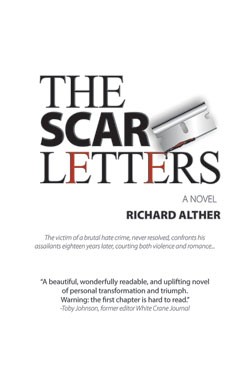
The Scar Letters is a different kind of coming-out story. Its narrator, 40-year-old Rudy Dallmann, has no problem attending kiss-ins with his activist best friend, Tex, or telling strangers he’s gay. What he does have a problem with is actually having sex. Achieving emotional intimacy? Even tougher.
Eighteen years ago, Rudy survived a vicious attack that left him with homophobic slurs carved on his body. The cop on the scene blamed him instead of the teenage perpetrators. Now, prompted by the firebrand Tex, Rudy wants to find his attackers. In the process, he hopes he’ll come to understand why his long-delayed attempts at love never seem to lead to anything real.
Rudy doesn’t hold the trauma solely responsible for his celibacy; instead, unlikely as it may seem, he identifies with the boys who maimed him. Like them (or so he imagines), he struggled to express his sexuality as an adolescent. “There is likely no shortcut in this part of life,” he speculates, “each one of us gay or straight flailing in the crucibles of our young years, given our society making of sex something so contemptuous instead of sane.”
Part-time Vermonter Richard Alther has crafted an ambitious novel that is at once a gay Bildungsroman, a midlife-crisis tale and an effort to strike at the root of the attitudes that contribute to violence against gays.
In September, Alther encapsulated his take on those attitudes on the Huffington Post. The problem, he argued, lies in defining people solely in terms of sexual acts: “[U]nless we acknowledge that same-sex couples and single gays are just as loving, complicated, libidinous, sometimes sexual, sometimes not — in other words, just as human and normal — as everyone else, a large swath of our population will remain disgusted with the whole business.”
While it shouldn’t, of course, be necessary to point out that gay people are “human and normal,” what Alther seems to mean by those words is actually “ridiculously diverse.” The Scar Letters demonstrates that being “human and normal” — and gay — encompasses Rudy’s celibacy, Tex’s promiscuity and a million possibilities in between.
Rudy points out that for every gay man pursuing sexual encounters with stereotypical horn-dog abandon, “there are ten straight men doing the exact same thing … The governor of New York! And it lands him a television show!” In a chapter where Rudy visits an “ex-gay” group (some of whose members are not so ex-), Alther depicts enough individual variations on sexuality to warm the heart of Alfred Kinsey or Michel Foucault.
“Even openly gay, I can’t be branded,” Rudy finds himself discovering. “I swear no two gay relationships are alike.” Yet all those relationships, both sexual and emotional, have a common denominator: the search for human connection. And sometimes, Rudy learns, such connections emerge in unlikely places.
The novel’s style is as daring as its content. Alther uses first-person and present tense to convey Rudy’s experiences with a sensuous immediacy that sometimes borders on Joycean stream of consciousness.
The results can be gripping, as in the opening narration of the attack. And Alther’s painterly skill with words eases us through long introspective and descriptive passages, such as an image of a beach with “dunes that beckon like magnificent dumplings, shimmering and indulgent.”
As the novel goes on, however, its pace tends to stagnate, with insufficient outward action and plot progression to balance the inward tendency. Many chapters focus on Rudy’s rehashing of his childhood in therapy, always a dangerously static subject for a novelist. In addition, Alther too rarely adjusts his diction and syntax when he shifts from Rudy’s narration to the dialogue, a habit that makes us feel trapped in Rudy’s head and renders some key conversations stilted.
Overall, The Scar Letters would have benefited from more rigorous editorial streamlining (along with more vigilant copyediting) to showcase its language and insights. I only mention these failures because Alther’s prodigious talent and originality shine through even his novel’s most awkward passages. The book feels like a work in progress, but one with seeds of greatness. It suggests that, for all of us, “coming out” as a human being is harder than it looks.
"The Scar Letters" by Richard Alther, Centaur Books, 234 pages. $16.95.
The original print version of this article was headlined "Quick Lit: Out, Proud ... and Alone"










Comments
Comments are closed.
From 2014-2020, Seven Days allowed readers to comment on all stories posted on our website. While we've appreciated the suggestions and insights, right now Seven Days is prioritizing our core mission — producing high-quality, responsible local journalism — over moderating online debates between readers.
To criticize, correct or praise our reporting, please send us a letter to the editor or send us a tip. We’ll check it out and report the results.
Online comments may return when we have better tech tools for managing them. Thanks for reading.